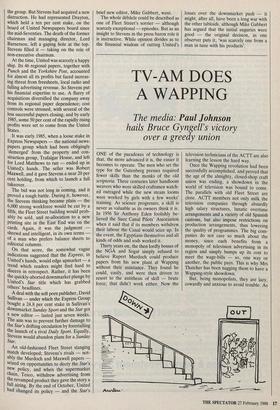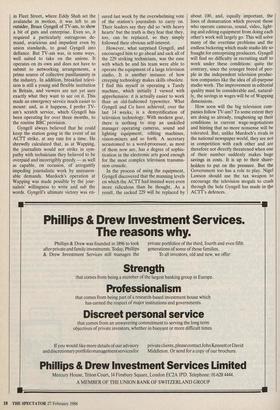TV-AM DOES A WAPPING
The media: Paul Johnson
hails Bruce Gyngell's victory over a greedy union
ONE of the paradoxes of technology is that, the more advanced it is, the easier it becomes to operate. The men who set the type for the Gutenberg presses required fewer skills than the monks of the old scriptoria. Three centuries later handloom weavers who were skilled craftsmen watch- ed outraged while the new steam looms were worked by girls with a few weeks' training. As science progresses, a skill is never as valuable as its owners think it is. In 1956 Sir Anthony Eden foolishly be- lieved the Suez Canal Pilots' Association when it said that if its members withdrew their labour the Canal would seize up. In the event, the Egyptians themselves and all kinds of odds and sods worked it.
Thirty years on, the then lordly bosses of the NGA and Sogat simply refused to believe Rupert Murdoch could produce papers from his new plant at Wapping without their assistance. They found he could, easily, and were then driven to resort to the antithesis of skill — brute force; that didn't work either. Now the television technicians of the ACTT are also learning the lesson the hard way. Once the Wapping revolution had been successfully accomplished, and proved that the age of the almighty, closed-shop craft union was ending, a showdown in the world of television was bound to come. The parallels with old Fleet Street are close. ACTT members not only milk the television companies through absurdly high salary structures, lunatic overtime arrangements and a variety of old Spanish customs, but also impose restrictions on production arrangements, thus lowering the quality of programmes. The big com- panies do not care so much about the money, since each benefits from a monopoly of television advertising in its region and simply bumps up its cost to meet the wage-bills — so, one way or another, the public pays. This is why Mrs Thatcher has been nagging them to have a Wapping-style showdown.
But, being monopolists, they are lazy, cowardly and anxious to avoid trouble. As
in Fleet Street, where Eddy Shah set the avalanche in motion, it was left to an outsider, Bruce Gyngell of TV-am, to show a bit of guts and enterprise. Even so, it required a particularly outrageous de- mand, avaricious and impudent even by union standards, to goad Gyngell into defiance. But TV-am was, in some ways, well suited to take on the unions. It operates on its own and does not have to submit to networking arrangements, a prime source of collective pusillanimity in the industry. In addition, breakfast televi- sion is still a young and flexible institution in Britain, and viewers are not yet sure exactly what they want to see on it. This made an emergency service much easier to mount: and, as it happens, I prefer TV- am's scratch service, which Gyngell has been operating for over three months, to the routine BBC provision.
Gyngell always believed that he could keep the station going in the event of an ACTT strike, at any rate for a time. He shrewdly calculated that, as at Wapping, the journalists would not strike in sym- pathy with technicians they believed to be overpaid and incorrigibly greedy — as well as capable, on occasion, of arrogantly impeding journalistic work by unreason- able demands. Murdoch's operation at Wapping was made possible by the jour- nalists' willingness to write and sub the words. Gyngell's ultimate victory was en- sured last week by the overwhelming vote of the station's journalists to carry on. Their leaders say they did so 'with heavy hearts' but the truth is they fear that they, too, can be replaced, so they simply followed their obvious self-interest.
However, what surprised Gyngell, and encouraged him to go ahead and sack all of the 229 striking technicians, was the ease with which he and his team were able to operate the equipment of a large television studio. It is another instance of how creeping technology makes skills obsolete. I find this myself in operating a Tandy machine, which initially I viewed with apprehension: it is actually easier to work than an old-fashioned typewriter. What Gyngell and Co have achieved, over the last 14 weeks, is a demystification of television technology. With modern gear, there is nothing to stop an unskilled manager operating cameras, sound and lighting equipment, editing machines, vision-mixers and so forth. A secretary accustomed to a word-processor, as most of them now are, has a degree of sophis- tication in the electronic arts good enough for the most complex television transmis- sion console.
In the process of using the equipment, Gyngell discovered that the manning levels on which the ACTT had insisted were even more ridiculous than he thought. As a result, the sacked 229 will be replaced by about 100, and, equally important, the lines of demarcation which prevent those who operate cameras, sound, video, light- ing and editing equipment from doing each other's work will largely go. This will solve many of the overtime problems and the endless bickering which made studio life so fraught for enterprising producers. Gyngell will find no difficulty in recruiting staff to work under these conditions: quite the contrary, since the younger breed of peo- ple in the independent television produc- tion companies like the idea of all-purpose studio work. The improvement in editorial quality must be considerable and, natural- ly, the savings in wages will be of Wapping dimensions.
How soon will the big television com- panies follow TV-am? To some extent they are doing so already, toughening up their conditions in current wage-negotiations and hinting that no more nonsense will be tolerated. But, unlike Murdoch's rivals in the national newspaper world, they are not in competition with each other and are therefore not directly threatened when one of their number suddenly makes huge savings in costs. It is up to their share- holders to put on the pressure. But the Government too has a role to play. Nigel Lawson should use the tax weapon to encourage the television moguls to crash through the hole Gyngell has made in the ACTT's defences.



















































 Previous page
Previous page